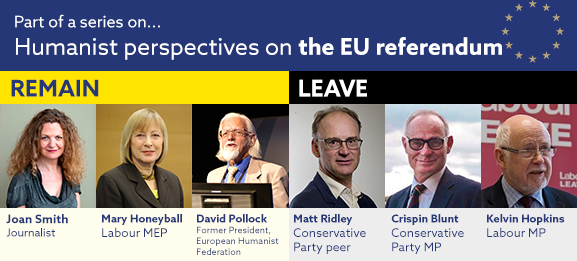This blog is part of a series of perspectives on the EU referendum from prominent humanists on either side of the debate. Each puts forward a humanist case for the United Kingdom either remaining a member of, or leaving, the European Union. All six perspectives are linked in the image below.

Kelvin Hopkins: Lead a more democratic Europe from outside the EU
The European Union is anti-democratic, anti-socialist, and failing economically. With low and negative economic growth, 25% unemployment and 50% youth unemployment in some member states, living standards cut by a quarter in Greece, forced privatisations and restrictions on collective bargaining rights as conditions of bailouts, the true nature of the EU is now plain to see.
Free movement of labour is designed simply to reduce wages and reduce wage bargaining strength. The Laval and Viking Line cases where the European Court ruled in favour of employers and against trade unions made a nonsense of the supposed EU Charter of Fundamental Rights and were a clear indication of the direction of travel being steered by the EU’s masters. Raising up the market and market forces against elective democracy was evident from the start in its original name, the Common Market, and was opposed at the time by British socialists including Hugh Gaitskell, Clement Attlee and Nye Bevan.
In a Commons debate in 1989, Tony Benn MP said, ‘I was brought up to believe, and I still believe, that when people vote in an election they must be entitled to know that the party for which they vote, if it has a majority, will be able to enact laws under which they will be governed. That is no longer true. Any party elected, whether it is the Conservative party or the Labour party can no longer say to the electorate, “Vote for me and if I have a majority I shall pass that law,” because if that law is contrary to Common Market law, British judges will apply Community law.’
Labour’s policies of public ownership such as returning the railways to the public sector will not be possible if EU free-market rules are applied. The franchising of Britain’s railway operations as supposed ‘privatisation’ is especially bizarre when Deutsche Bahn, the German state railway owns much of Britain’s public transport services, with British passengers effectively subsidising Berlin commuters.
The recent EU Fourth Railway package will soon be forcing continental EU state railways into the same mould as that in Britain.
Some people of faith say that membership of the EU is primarily a matter of values not economics. I say that does not cut much ice if you have no home, if you have no job, or if the government is forced to close down or sell off public services at the behest of the European Central Bank. The reality is that the EU is an arm of neo-liberal capitalism which is and has failed across the world and which even the IMF has now concluded. By remaining in the EU the UK will find itself dragged down in a sinking vessel.
The European Union project moved slowly and by stealth at first, later accelerating following the 1980s Single European Act. It was clearly intended to promote the dismantling over time of the post-war social democratic structures which brought such massive benefits to millions of working people across Western Europe.
The current secretive negotiations to impose TTIP, the proposed EU/USA trade deal which would give massive power to the giant private corporations to be able to prosecute democratically elected member state governments is conclusive proof – if further proof were needed – about the true nature of the EU.
It is time for democratic member state governments once again to stand up for their peoples and to reject the EU. The United Kingdom has an opportunity to take the lead in that process by voting ‘Leave’ in the coming referendum.
That being said, I always emphasise that the European Union is not Europe. The European Union is simply a political construct covering many of the countries of Europe. Europe is a sub-continent of great peoples, beautiful countries and superb culture. Democracy, socialism and trade unionism were all created in Europe. We can have a great Europe without the EU, a Europe of international friendship and solidarity which will not sell out working people to the global corporations. Britain can lead the way to that different Europe as other countries in the EU see the advantages of independence and a renaissance of democracy.